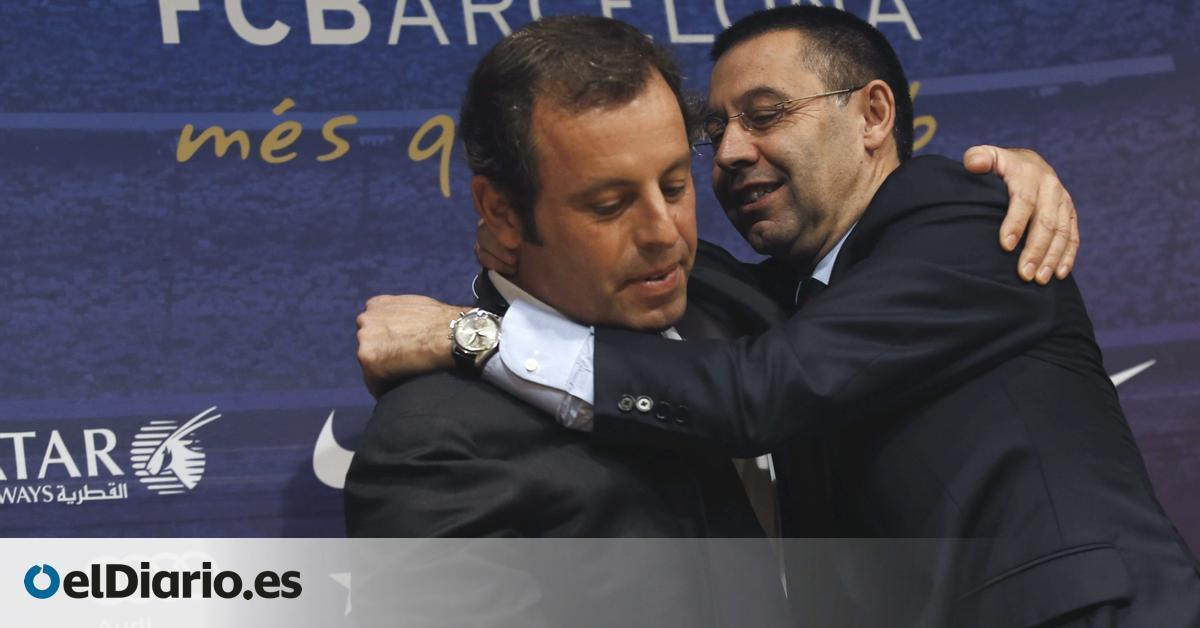
The Negreira case has begun to walk in the courts of Barcelona. The judge has admitted for processing this Wednesday the complaint of the Prosecutor’s Office, as well as the appearance in the case of the referee Xavier Estrada and the Professional Football League as accusations, and has commissioned the Civil Guard to be the Judicial Police of the case .
In a car, the magistrate instructs the Civil Guard to carry out the “necessary procedures” to determine “the reason or work” for which Barça paid close to 4.8 million euros during the presidencies of Sandro Rosell and Josep Maria Bartomeu (2010-2018) to the companies of the former Vice President of the Technical Committee of Referees (CTA) José María Enríquez Negreira. Taken together, the club’s payments to Negreira amounted to €7.3 million between 2001 and 2018, when Bartomeu decided to end the payments.
The judge also instructs the Armed Institute to find out “the destination” of the money collected from Barça by Enríquez Negreira’s companies to corroborate if, as the Prosecutor maintains, the disbursements served to receive arbitration favors or if they simply stayed in the pockets of the former collegiate
Once the Civil Guard concludes its investigation, adds the magistrate, the statements of those investigated will proceed – the former presidents Rosell and Bartomeu, Negreira, Barça itself as a legal entity and the former club executives Albert Soler and Óscar Grau – and of the witnesses – the former presidents Joan Laporta and Joan Gaspart and the former coaches Luís Enrique Martínez and Ernesto Valverde, among others.
The magistrate explains the reason why the summons of the accused will not be immediate. The judge argues that the previous investigation by the Prosecutor’s Office and the National Police into the Negreira case is incomplete, since the filing of Estrada’s complaint forced the Public Ministry to cease its proceedings. Now the judge agrees to change the police force and that the Civil Guard be in charge of the case.
“The police investigation cannot be understood as concluded in order to determine the reason for which the payments were made as well as the destination collected by” the Negreira companies, the judge expressed in her order, in which she also highlighted that, from the inspection carried out by the Treasury, “an increase in wealth in the ex-arbitrator was not appreciated”.
In this sense, the magistrate points to another of the focuses of the Civil Guard investigation: to find out where the money that Barça paid Negreira went. To do this, as requested by the Prosecutor’s Office, the judge considers it “pertinent” to carry out a patrimonial investigation of the former collegiate “and his closest environment”, in reference to his son.
In addition, the judge instructs the Armed Institute to identify the people who held the position of general director, executive director and financial director, treasurer or head of the economic area of the club between 2011 and 2014, who will also foreseeably be charged in a case opened by the crimes of corruption in sports, unfair administration and false commercial documents.
The judicial investigation does not start from scratch. The Prosecutor’s Office and the Treasury have been investigating Barça’s payments to Negreira’s company and their conclusions are not very flattering for the Barça club. The Public Ministry accuses Barça of bribing Negreira to receive favors on the pitch. The Prosecutor’s Office maintains that the club’s payments to the former referee in exchange for reports on advice only masked what in reality was his intermediation in the arbitration group.
In the tax inspection, Barça admitted in 2021 that “it had not found” in the club’s files documents that identified the professionals who had made the videos on referees allegedly made by Negreira. Nor did the club find any copies of the videos or documents in which the orders to Negreira were carried out.
Consequently, Barça agreed to pay the Treasury 1.01 million euros to regularize the payment of Corporate Tax and VAT that was attempted to be deducted through Negreira’s invoices, but that the Treasury considered non-deductible after verifying that there was no relationship between the expense billed and the service actually provided.
Source: www.eldiario.es

